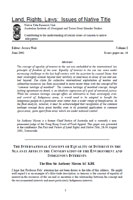The international concept of equality of interest in the sea as it affects the conservation of the environment and indigenous interests
The concept of equality of interest in the sea was embedded in the international law principle of freedom of the seas. Equality of interest in the sea has come under increasing challenge in the last half-century with the assertion by coastal States that their sovereignty extends beyond their territory or land mass to areas of sea and seabed beyond. The claim for collective international exploitation of marine and submarine resources has been associated in more recent times with the concept of the “common heritage of mankind”. The common heritage of mankind concept, though lacking agreement on detail, is an idealistic expression of a goal of universal justice.
While the common heritage concept offers an alternative to State sovereignty over, and control of, Indigenous areas, it would need to be adapted to benefit the Indigenous people in a particular area rather than a wider range of beneficiaries. In the final analysis, however, it must be acknowledged that recognition of the common heritage concept faces great hurdles even in its potential application to common space areas, quite apart from areas which are under national control.
This paper was presented at the conference The Past and Future of Land Rights and Native Title, 28-30 August 2001, Townsville.
